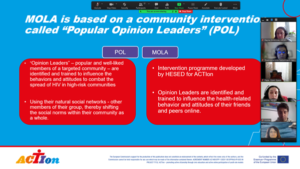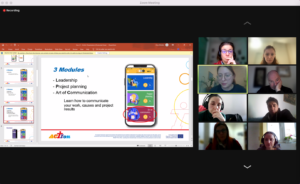
31 Jan ACTIon international capacity building training for trainers
31 Jan, 2022
This week was very busy for ACTIon. One of the main highlights was the international capacity building training for trainers, organised on 25-26th January. It was for the trainers who will implement the two programmes – DigiPAC and MOLA – in Bulgaria, Germany, Greece, and North Macedonia. The training was planned as a face-to-face activity in Sofia, but eventually, had to take place online. Nevertheless, nexus and HESED, the partners who adapted the two training models from previously existing good practices, ensured the success of the training.
 The training was delivered in two days and twelve trainers attended it. Day one was dedicated to the DigiPAC: Digital Participation and Active Citizenship programme. DigiPAC is addressed to school students and aims to develop their digital and democratic competences by enabling them to use online tools to actively participate in their community. Nexus team of trainers and researchers led the workshops on this topic. Trainers learned and discussed about netiquette, “do’s” and “don’ts” in online communication, what electioneering is and how to moderate an online debate, as well as how to use the two selected digital tools for online participation – the OPIN platform and the F.I.R.E. app.
The training was delivered in two days and twelve trainers attended it. Day one was dedicated to the DigiPAC: Digital Participation and Active Citizenship programme. DigiPAC is addressed to school students and aims to develop their digital and democratic competences by enabling them to use online tools to actively participate in their community. Nexus team of trainers and researchers led the workshops on this topic. Trainers learned and discussed about netiquette, “do’s” and “don’ts” in online communication, what electioneering is and how to moderate an online debate, as well as how to use the two selected digital tools for online participation – the OPIN platform and the F.I.R.E. app.
 On the second day, our partner HESED trained partners on the second programme, MOLA: Model for Opinion Leaders Activation. It is addressed to young adults and aims to support community workers to empower youngsters as Popular Opinion Leaders who would then promote critical and informed use of online information among their peers. In this module trainers learned how to discuss the topic of fake news and online disinformation with the youngsters, but also how to identify opinion leaders and “activate” them to use online social networks to promote behavioural change among their peers on a specific topic. The topic could be anything that is relevant for the young people and their community, but it needs to be selected in advance to channel their communication efforts. For example, HESED has selected the topic of child nutrition and will work with young mothers from the Roma community in Sofia to enable them to promote relevant messages to their peers online.
On the second day, our partner HESED trained partners on the second programme, MOLA: Model for Opinion Leaders Activation. It is addressed to young adults and aims to support community workers to empower youngsters as Popular Opinion Leaders who would then promote critical and informed use of online information among their peers. In this module trainers learned how to discuss the topic of fake news and online disinformation with the youngsters, but also how to identify opinion leaders and “activate” them to use online social networks to promote behavioural change among their peers on a specific topic. The topic could be anything that is relevant for the young people and their community, but it needs to be selected in advance to channel their communication efforts. For example, HESED has selected the topic of child nutrition and will work with young mothers from the Roma community in Sofia to enable them to promote relevant messages to their peers online.

Each training module was presented to the trainers and illustrated by at least one practical activity directly taken from the programmes. The trainers put themselves in the shoes of trainees, experienced the exercises included and shared feedback and tips from their previous experience. The chance to try out some of the activities in an online environment was very useful for the trainers to know what to expect when they will be working with the young people.

The capacity building training was also an opportunity for partners to provide feedback on the training programmes. Now nexus and HESED will take this feedback to improve the programmes, which will then be implemented in the partner countries starting from March. The big advantage of the ACTIon training programmes is that the work with the young people will not end with the training. In fact, the training itself will be the beginning of a follow-up work with them, when the trained role models/youth target groups will initiate education or participation projects such as self-organised youth e-participation projects using OPIN or F.I.R.E., or communication campaigns on selected topics. Partner organisations and trainers will support them in their parcourse, which will ensure that they will actually implement the knowledge and skills that they’ve acquired.





